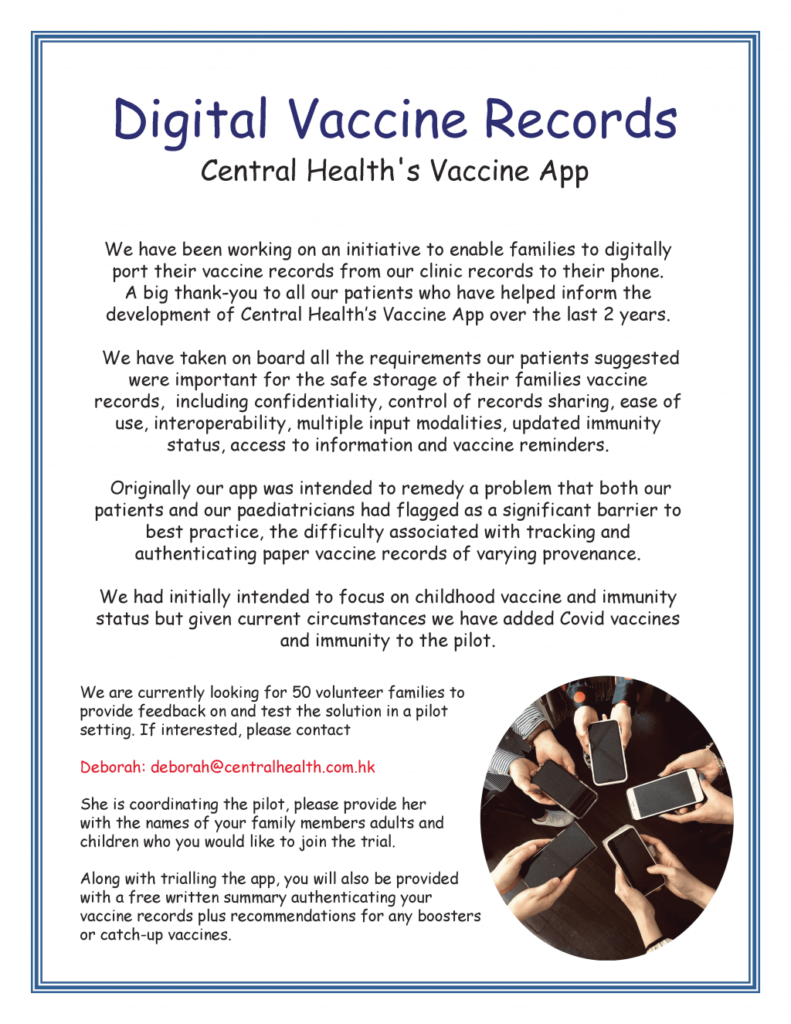2020 generated plenty of uncertainty around the Covid-19 infection and its impact on our daily lives. Now 2021 looks set to be all about the vaccines and their imminent roll-out across the world. We hope this update will help you to understand our position here in Hong Kong by answering a few of the most common questions we are being asked:
What are the different types of vaccine available to us, will we get to choose and what factors should determine our choices.
All the vaccines will be free and voluntary. After initial reports to the contrary, the government has now categorically stated that we will get to choose which one we will receive. So, in order to help you make an informed decision, here is a brief summary of your choices:
- Sinovac Biotech – 7.5 million doses of “CoronaVac” have been purchased from this Beijing-based company. This is an inactivated vaccine which works by using killed viral particles to expose the body’s immune system to the virus protein without risking a serious disease response – a more conventional vaccine technology that can be stored at normal fridge temperatures. All the vaccines including this one require a two-dose schedule for a full response. There has been a delay in Hong Kong approving the Sinovac due to lack of data from phase 3 trials, we know however that most members of the CPPCC in both China and Hong Kong have already received their first dose of this vaccine which gives us some confidence on safety.
- Pfizer-BioNTech – 7.5 million doses of “BNT162b2” have been purchased from Europe and will be supplied via Fosun Pharma. It uses a novel mRNA technology which is explained in more detail in the video linked below. In short, only part of the coronavirus’ genetic code is injected into the body, not the virus itself. mRNA is the code for building the protein found on Covid-19 but it does NOT get incorporated into our own human DNA. One of the disadvantages of this vaccine is the need to store it at extremely cool temperatures. But one of its advantages is the speed of production and ability to scale up quantity if needed.
- Oxford Astra-Zeneca – 7.5 million doses of “ChAdOx1” has been purchased from the UK. A genetically engineered common cold virus in chimpanzees is modified to transport part of the Covid-19 DNA into our human cells. Our own cells then use this DNA to make Covid-19 viral proteins whilst the chimp virus is harmlessly degraded. This vaccine is also stored at normal fridge temperatures and has the additional advantage of being one of the cheapest to produce.
Which one is best?
Put simply, all the vaccines have proven to lower your chances of getting sick and spreading the disease to others. In addition to that, the side effects of each brand have also been carefully studied and found to be similar to other vaccines. It is too early to say which has the superior efficacy or safety, as none of them have been tested head-to-head. Comparisons will surely be made and more evidence pointing towards superiority will emerge as millions of doses are administered over time. Until then, for patients at risk of severe disease (over 60, overweight or with pre-existing conditions) the best vaccine is the one you can get the soonest.
Patients at very low risk of severe disease will likely be offered/eligible for vaccination later in the year when there should be the option of all three vaccines and more information on efficacy.
Where and when can I get my vaccine?
This is our current understanding pending confirmation from the government.
Government vaccine centres
Each of Hong Kong’s 18 districts will have one government vaccine centre, each centre plans to dispense 2,500 doses a day of the Pfizer-BioNTech vaccine. (The vaccine centre having 15 booths vaccinating 13 patients per hour operating 8am to 8pm every day including Sundays and Public Holidays). Rationale being that government centres will have the provisions for the -70C storage of the mRNA vaccines and manpower to administer it. We believe there will be a centralised booking system staffed by civil servants and those at high risk will be given priority (over 60, or with pre-existing conditions).
Separate arrangements will be made for visiting doctors to vaccinate care homes and other institutions with vulnerable groups. The roll out of the Pfizer vaccine at government vaccination centres was originally expected to commence on 16th February, we understand this has been delayed and the earliest expected date of commencement is 22nd February. Our clinic has registered to help at the Government vaccination centres and we are preparing a list of our high risk patients so that we can give them more information about eligibility.
Private clinics
We believe private clinics will be allowed to administer both the Sinovac and the AstraZeneca vaccines given that only regular fridge temperatures are required.
Of the three vaccines the government has procured so far, Sinovac and Pfizer are expected to arrive sometime around Chinese New Year. The Oxford vaccine is due to arrive in June.
Again we have registered our interest in providing both Sinovac and AstraZeneca vaccines in our clinic, we expect start dates will be confirmed soon.
Should children be vaccinated?
The first and most important point is that although children can get Covid-19, they seem to get it less often than adults and it’s usually asymptomatic or extremely mild. The social distancing and mask wearing is certainly helping to reduce cases of all the usual respiratory illnesses which we commonly see this time of year, one of the very few Covid-19 silver linings. With respect to vaccines, they have only been tested and proven to be safe and effective in those aged 16 and above. For anyone younger than this, there simply isn’t any consensus yet so we expect no vaccination will be offered to children for quite some time.
If you have any specific concerns about Covid-19 and your child’s health please email your paediatrician/family doctor or ask for a phone consult.
Vaccines in pregnancy and those trying to get pregnant
Unfortunately, the vaccine trials excluded pregnant women, although some participants did become pregnant during the course of the study. These numbers were low. However, for the Pfizer trial, 12 patients became pregnant in the vaccine arm and 11 in the placebo arm. Not only are the numbers very small but the outcomes for these women are yet to be reported, most likely because the women are still pregnant. Therefore, it is currently difficult to give evidence-based reassurances on the safety of these vaccines in pregnancy.
Having said that, there is no theoretical risk to pregnant women or their babies from the technology used by these vaccines, and if you do have a serious underlying health condition and are pregnant, then a discussion with your GP or obstetrician to discuss the risk vs benefit balance would be worthwhile.
Covid-19 and Pregnancy
The overall risk of severe complications for pregnant women with Covid-19 is low. Pregnant women tend to be younger, fitter and healthier than the general public, meaning the risk of serious complications from this disease is lower.
A recent study published in January 2021 in the JAMA has shown this to be true. This large study looked at over 400,000 women giving birth in the U.S. from April to November 2020. Of these women, some 6000 had Covid-19 and so the researchers were able to compare the outcomes of women delivering with and without it. The results showed:
The risk of serious complications in women with Covid-19 was uncommon: 3.3% needed ICU admission, 1.3% needed mechanical ventilation and death was rare at 0.1%.
However, these complications occurred even less frequently in women without Covid-19, meaning that Covid-19 in pregnancy does significantly elevate the risks to the mother.
There was also a higher risk of preterm birth, preeclampsia and thrombotic events in the women with Covid-19 compared to those without (although in reality this translates to only a small increase in the risk when looked at in absolute terms. For premature birth, for example, the risk was 5.8% in the Covid-19 free group vs. 7.2% in the Covid-19 group).
Unfortunately, this study did not look specifically at the risk of mothers passing Covid-19 to their babies during birth, but it appears from other data that this is not common and we know from the reports we have of babies developing Covid-19 soon after birth, that most remain very well.
There have not been any reports of Covid-19 in pregnancy being linked to problems with the baby’s development, nor is there any evidence that it increases your risk of miscarriage.
The take home message if you are pregnant, is that the risks of Covid-19 are low but higher than if you weren’t pregnant, so it is advisable to do everything you can to avoid catching it. This is particularly important after 28 weeks when it seems the risk of a serious Covid-19 infection is greatest. This means:
Adhere to social distancing rules
Wear a good quality mask
Wash your hands regularly
Strict shielding if you do have an underlying health condition such as pre-existing diabetes (gestational diabetes does not significantly increase the risks over just being pregnant), if you are overweight or are from a minority ethnic background.
Ensure you are taking a vitamin D supplement (advised for all pregnant women anyway).
Covid-19 Relief Maternity Packages at Matilda Hospital
In light of the ongoing coronavirus pandemic, we will be offering a reduced obstetric package through 2021, for those patients wishing to switch from a public to a private hospital for their delivery.
The discount will cover Central Health obstetric, anaesthetic and paediatric charges, and will apply to our standard class room type only.
The Matilda Hospital will join us in offering a reduced rate for a standard class room package. Patients booked on the special package can choose their obstetrician. However, they should be advised that, in the unlikely event their usual doctor is busy at another hospital or with another patient, it is possible they could be delivered by any one of other obstetricians.
Please contact our midwives before you are 34 weeks for further information and pricing details (midwives@centralhealth.com.hk).
Where can I get access to more information?
You may have lots of other questions about the vaccine and we encourage you to do your own research. The following is not an exhaustive list but a good start to learning more about this topic which will no doubt be covered extensively throughout this entire year.
- How mRNA and DNA vaccines work:
www.youtube.com/watch?v=35Idb_lCU4o&t=44s - HK government Covid-19 page:
www.coronavirus.gov.hk/eng/index.html - WHO Covid-19 vaccine page:
www.who.int/emergencies/diseases/novel-coronavirus-2019/covid-19-vaccines - NHS Covid-19 vaccine page:
www.nhs.uk/conditions/coronavirus-covid-19/coronavirus-vaccination/coronavirus-vaccine/ - CDC Covid-19 vaccine page:
www.cdc.gov/vaccines/covid-19/index.html







